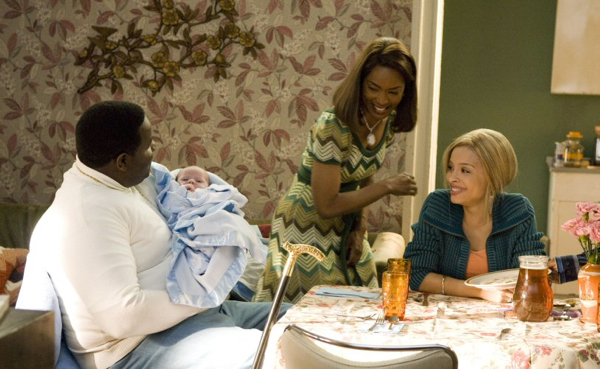Movie review by Greg Carlson
An almost absurdly reductive outline that dramatizes the best-known highlights of the short life of Christopher Wallace (known better as the Notorious B.I.G.) while skipping over any real opportunity to explore the mind of one of hip hop’s greatest artists, “Notorious” will appeal to many viewers too young to have experienced the superb MC’s impact while he was alive. Essentially, the movie delivers exactly what most fans will want, even if it sidesteps the thornier dilemmas faced by a character as complex as Biggie. Much of the film tumbles by like a series of extended montages, and large sections of Wallace’s life become subplots with scenes so brief they appear unchanged from the soundbites and clips in the trailer.
Wallace’s mother Voletta and impresario Sean Combs, along with a pair of former managers, receive some type of producing credit, an instant indication that “Notorious” will not be as concerned with subtlety as it will with polishing the already sterling legend that routinely sees B.I.G.’s name at the top of many “greatest rapper of all time” lists. While there is nothing necessarily wrong with this – most biopics could be described as encomia – “Notorious” tackles only some of the largest conflicts faced by Wallace in his 24 years while completely ignoring others. The pair of 1996 arrests that included drug and weapons charges, for example, goes undocumented.
Watching “Notorious” replicates the odd sensation of attending a costume party in which facsimiles of 1990s hip hop personalities try on the clothes and mannerisms of those who made them famous. Although the script has little time to develop them as full-fledged characters, the romantic partners in Wallace’s life, including first serious girlfriend Jan (Julia Pace Mitchell), protégée Lil’ Kim (Naturi Naughton) and whirlwind spouse Faith Evans (Antonique Smith), all read as vibrant and persuasive in their hurt at being wronged by Biggie’s irresponsibility and lack of fidelity. Less convincing are the over-the-top portraits of Sean Combs and Tupac Shakur, played by Derek Luke and Anthony Mackie. Both actors have been outstanding in past movies, but in “Notorious” their work has the exaggerated quality associated with someone playing a game of charades.
At the film’s center, Jamal Woolard fashions a credible performance, although most of the time, his Biggie Smalls lacks edge in favor of too much innocence. Ultimately, what “Notorious” needs most is the presence of the genuine article. The screen B.I.G. tries to be too many things at once, so that when Faith Evans asks Biggie whether he is a bad guy trying to be good or a good guy trying to be bad, the audience wonders the same thing. “Notorious” never offers a satisfying answer to that question, as writers Reggie Rock Bythewood and Cheo Hodari Coker prefer to cram clichéd life lessons down the throats of audience members who deserve something less patronizing.
The feeling of doom that haunts “Notorious” from its first scene to its last speaks to the frustration and pain experienced by many hip hop fans. The contradictory intersection of entertainment and violence – that place where the fantasy of Hollywood crime films and mob boss monikers becomes confused with the impulse to do real harm to a media-constructed “rival” – is replicated at the beginning and end of “Notorious,” but that aspect of the narrative remains as murky and un(re)solved as Wallace’s 1997 murder.
